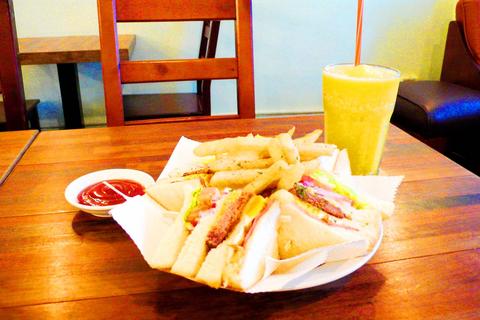"Plain and humble" is the English translation of Yang Chun (陽春), and the cafe-cum-restaurant lives up to its name. The design isn't smart; the menu isn't fancy. There isn't even a sign. The tiny doorplate, a banyan tree and an old light-blue wooden door are all there is to denote its existence in a quiet alley off Guangfu South Road (光復南路) near the Sun Yat-sen Memorial Hall (國父紀念館).
An uncontrived, vintage feel permeates the room. The cafe was renovated from an old-fashioned apartment with a courtyard out front, and retains a nostalgic ambience. Simple wooden chairs and tables, a sofa and opalescent walls lend the restaurant the feeling of a homey living room. The dim lights, hung from the ceiling, keep the room soothingly subdued, even during the day. Classical music pervades the air and a giant wooden-framed mirror on the wall reflects the room like a painting.
The wireless Internet service seems anachronistic: a nod to 21st-century technology in an otherwise vintage establishment.

PHOTO: HO YI, TAIPEI TIMES
It's true that a house can say a lot about its owner. A calm, polite man, the proprietor doesn't talk much and spends most of his time standing behind the bar and preparing Yang Chun Shop's light repasts.
From coffees, teas, flavored sparkling soda waters, cocktails, red and white wines to Japanese and Hong Kong milk teas, smoothies and milk shakes, the beverage selection is multi-cultural and scores well in blog reviews.
As for the food, there is a limited selection of salads, pastas, sandwiches and omelets as the proprietor apparently prefers to excel in a few signature dishes rather than expand the menu and run the risk of mediocrity.
The beef patty club sandwich with french fries (NT$280) is one of the tastiest items on the menu. Layers of lettuce, tomato slices, ham and egg flavored with barbeque sauce and mayonnaise provide a rich melange of flavors and the fries put those served at American chain restaurants to shame.
Pain de campagne with creamy mushroom soup (NT$200) is another specialty; the palatable large round loaf alone is worth a visit to the cafe. Although not eye-catching, the spicy garlic spaghetti (NT$250) lives up to its name and is not for the fainthearted. The basil mushroom omelet with pain de campagne (NT$250) is another popular dish among habitues.
The food here is served in large portions, and it is a good idea to consider sharing.
If you don't mind secondhand-smoke, the plain shop is a lovable place to while the day away surfing the Net, reading a book or spending time with friends.

Wooden houses wedged between concrete, crumbling brick facades with roofs gaping to the sky, and tiled art deco buildings down narrow alleyways: Taichung Central District’s (中區) aging architecture reveals both the allure and reality of the old downtown. From Indigenous settlement to capital under Qing Dynasty rule through to Japanese colonization, Taichung’s Central District holds a long and layered history. The bygone beauty of its streets once earned it the nickname “Little Kyoto.” Since the late eighties, however, the shifting of economic and government centers westward signaled a gradual decline in the area’s evolving fortunes. With the regeneration of the once

Even by the standards of Ukraine’s International Legion, which comprises volunteers from over 55 countries, Han has an unusual backstory. Born in Taichung, he grew up in Costa Rica — then one of Taiwan’s diplomatic allies — where a relative worked for the embassy. After attending an American international high school in San Jose, Costa Rica’s capital, Han — who prefers to use only his given name for OPSEC (operations security) reasons — moved to the US in his teens. He attended Penn State University before returning to Taiwan to work in the semiconductor industry in Kaohsiung, where he

In February of this year the Taipei Times reported on the visit of Lienchiang County Commissioner Wang Chung-ming (王忠銘) of the Chinese Nationalist Party (KMT) and a delegation to a lantern festival in Fuzhou’s Mawei District in Fujian Province. “Today, Mawei and Matsu jointly marked the lantern festival,” Wang was quoted as saying, adding that both sides “being of one people,” is a cause for joy. Wang was passing around a common claim of officials of the People’s Republic of China (PRC) and the PRC’s allies and supporters in Taiwan — KMT and the Taiwan People’s Party — and elsewhere: Taiwan and

Perched on Thailand’s border with Myanmar, Arunothai is a dusty crossroads town, a nowheresville that could be the setting of some Southeast Asian spaghetti Western. Its main street is the final, dead-end section of the two-lane highway from Chiang Mai, Thailand’s second largest city 120kms south, and the heart of the kingdom’s mountainous north. At the town boundary, a Chinese-style arch capped with dragons also bears Thai script declaring fealty to Bangkok’s royal family: “Long live the King!” Further on, Chinese lanterns line the main street, and on the hillsides, courtyard homes sit among warrens of narrow, winding alleyways and